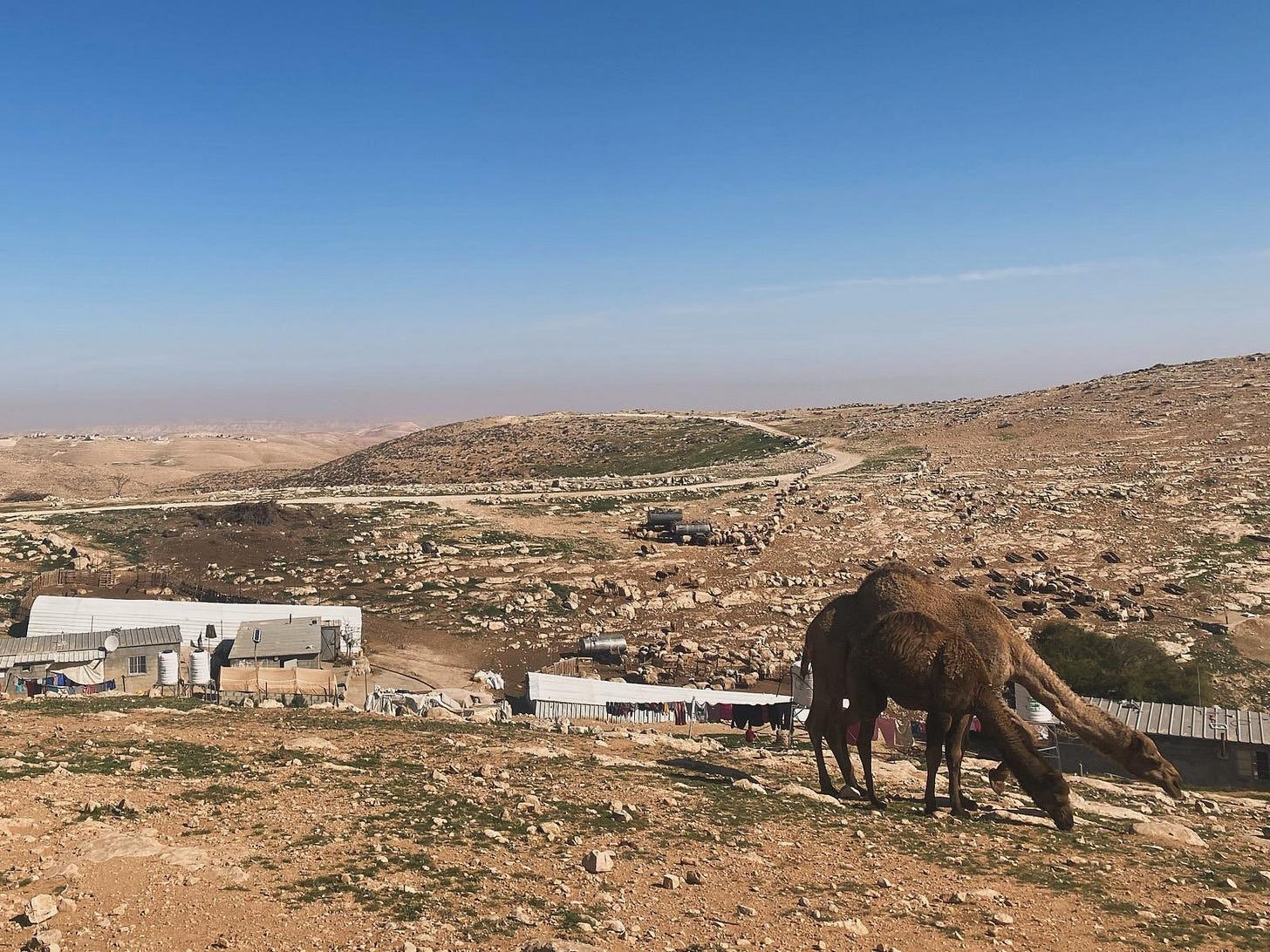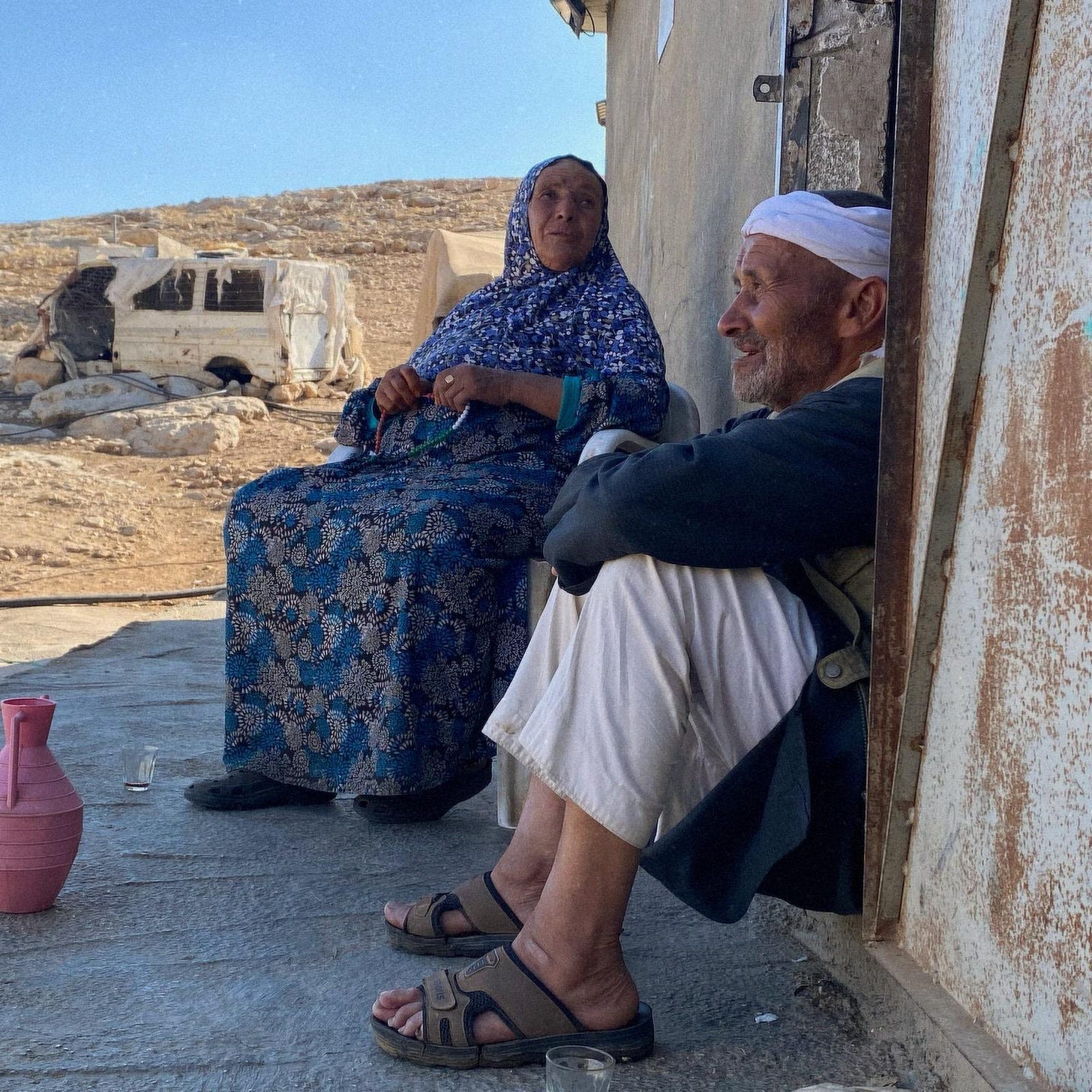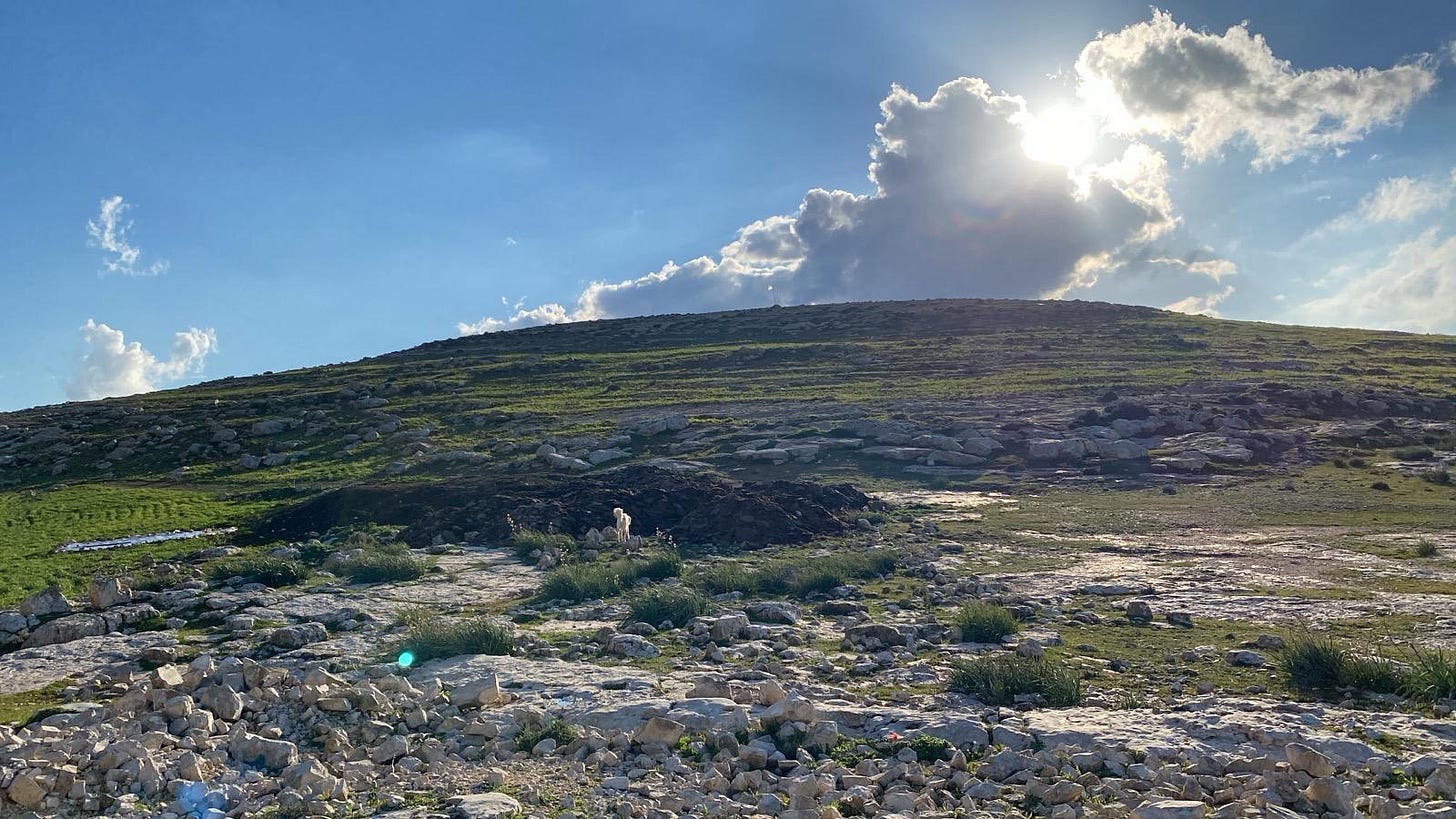Starving Palestine
Israeli colonialism and the struggle for food sovereignty in Masafer Yatta. Words by Manal Shqair. Photographs by Ali Awad.
Good morning and welcome to Vittles. In today’s newsletter, Manal Shqair writes about how Israel’s colonial systems of land-grabbing, industrial agriculture and surveillance affect nomadic-pastoralist communities in Masafer Yatta in southern Palestine.
This piece is part of a series on Palestine and Lebanon commissioned by Vittles in collaboration with N.A. Mansour. You can read the other essays in the series below:
When Food Doesn’t Taste Like Home, by Doha Kahlout
Sowing Solidarity: How Lebanon’s Wineries Remain Rooted, by Farrah Berrou
Starving Palestine
Israeli colonialism and the struggle for food sovereignty in Masafer Yatta. Words by Manal Shqair. Photographs by Ali Awad.
In August 2023, I sat with Umm Saleem on a rock, watching her camels graze. ‘Camels do not really need a shepherd to accompany them,’ she told me. ‘They can go deep in[to] the desert by themselves, graze, and return home’. Umm Saleem, in her mid-seventies, is a semi-nomadic pastoralist from the community of Khirbet Tuba in the region of Masafer Yatta, a semi-desert area in Southern Palestine. Around where we sit, craggy yellow mountains and hills are connected by valleys, where flocks of sheep and goats can still graze in the dry summer season from the end of April until September. In the past, these pastures extended further, and Umm Saleem herded sheep and camels towards them. But when the Israeli settlement Havat Ma’on was built close by in 2001, most of this land was taken over by the settlement and surrounding outposts. Now, the settlers’ white houses, encompassed by pine trees, dominate the hills that were once Palestinian land.
In August 2024, while Munther – one of Umm Saleem’s sons – was grazing his flock of 300 sheep in the family’s wheat and barley fields, four Israeli settlers, masked and carrying clubs, attacked him and stole his flock, leading the sheep towards Havat Ma’on. When Munther walked towards his flock with his wife and nephew, they were attacked by settlers and were severely injured. As Umm Saleem recounted, settler violence in Khirbet Tuba and other villages in Masafer Yatta has long been a daily occurrence, and has included assaults against shepherds, setting the communities’ crops and fodder on fire, uprooting their trees, and stealing their cattle. ‘Now I must watch my camels all the time’, she said.
Masafer Yatta is located in the West Bank’s Area C, which is under total Israeli control. Since the 1980s, Israel has designated a large section of land in the region as a closed military area known as Firing Zone 918. 2,500 Palestinians live across its 7,000 acres, and Khirbet Tuba is one of twelve villages there. After the establishment of the Firing Zone, the Palestinians who had lived in the area for generations were suddenly deemed trespassers on their own land and their villages illegal constructions, subject to demolition by Israeli bulldozers. The latest Israeli demolition campaign against shepherd families in the community of Umm El-Khair was launched as recently as June 2024.
Across Masafer Yatta, the lives of Palestinian pastoralists like Umm Saleem are organised around their animals, which they depend upon for continuity and survival. As most of the region comprises grazing land, growing olive trees in Masafer Yatta is rare, and semi-nomadic communities rely on home-made ghee as a primary fat. Until a few years ago, these lands were also a major source of wheat, rain-fed crops, and edible and medicinal wild plants such as ja’dah. ‘I used to ease my children’s abdominal pain by using ja’dah syrup. But as Israelis took over most of our pasturelands, accessing and using ja’dah for treatment is rare these days,’ Umm Abdullah, an elderly woman from Umm El-Khair, told me. As she says, pastoralist women in the area no longer practice herbal medicine-making, resulting in the loss of their roles as stewards of ancestral knowledge. This obstructs the transference of knowledge and skills to younger generations of women as well. Like ja’dah, akkoub – which is consumed with meat and dried yoghurt sauce, fried with olive oil and garlic, or in omelettes – was a wild plant that was gathered primarily by women when they grazed their herds. But, due to the increasing settler presence in Masafer Yatta, the foraging of akkoub is being obstructed.
Since Israel began its genocide of Gaza in October 2023, the accelerated erosion of traditional food systems has made Palestinians increasingly vulnerable to Israel’s mechanisms of violence; the starvation campaign Israel has waged on Palestinians in the Gaza Strip for the past sixteen months demonstrates this. But these systems of dispossession have been at play for much longer. For the past few decades, for instance, Israel has regularly sprayed herbicides on the eastern farmlands of the Strip to undermine agrarian life. In Masafer Yatta and across the West Bank, Israel’s colonial legislations have disrupted the relationships with, and strong sense of responsibility for, the land, animals and plants that Palestinian communities have maintained for centuries. Food plays a major part in how this is done.
According to official records, the story of Masafer Yatta’s dispossession by Israel starts in 1967, the year Israel occupied the West Bank. But the residents of the region contend this; a year before she passed away, ninety-five-year-old Hajah Fatima, from the village of al-Tuwani, recounted how Zionist paramilitary groups invaded her village of al-Qaryatain (in the south of Masafer Yatta) during the Nakba in 1948. The invading troops massacred a group of farmers who were harvesting their crops and expelled those that remained alive – like Hajah Fatima, who, while pregnant, fled with her flock of sheep and baby daughter. Al-Qaryatain was then annexed to the nascent state of Israel. Since 1967, however, Israel has used racist military decrees; restrictions on movement and access to pastures; home demolitions; and expulsions to tighten its colonial grip on the region, facilitating the confiscation of Palestinian land on which illegal Israeli settlements are built and expanded.
In 1999, these legislations culminated in the forcible expulsion of around 1,000 Palestinians residing in the twelve villages in Firing Zone 918 on the grounds that they lived ‘illegally’ in a firing zone. In court, the Israeli colonial authorities ruled that the communities lacked ownership rights to the land as they lived a semi-nomadic lifestyle. The court ruling exemplified Israel’s colonial logic, which associates nomadism with landlessness, a denial of indigenous Palestinian systems of land ownership. ‘I had to stand before the Israeli judge and claim that I was not a nomadic pastoralist’, Abu Hatem, a shepherd from Khirbet al-Mufagarah, told me. In 2000, the High Court of Justice (HCJ) issued an injunction stating that the communities could temporarily return to their homes as long as they adhered to a sedentary lifestyle. With the sheer power of the coloniser, the communities had to change their customs in order to survive on their own land.
Traditionally, Palestinian farming has centred around rain-fed agriculture (‘Ba’ali’ in the vernacular). This method is small-scale and involves strategies of cultivation: exploiting the soil moisture for growing crops without irrigation; using organic fertilisers; and a greater diversification of crops, where farmers cultivate the same field with a variety of crops such as wheat, barley, grapes, tomatoes, potatoes, beans, fig trees, garlic, and onions. However, over the last several decades, Israel has replaced Palestinian methods with industrial agriculture, a mode of large-scale farming which relies on intensive irrigation and chemical pesticides that depletes the land and causes pollution. This has restricted the mobility of semi-nomadic pastoralists, and consequently the diversity of plants that animals can graze. ‘The further south you go, the better the quality of the plants the cattle could graze,’ Muhammed, a shepherd from Jinba, told me. ‘Plants like wild peach – herbs like the medical plant of Sheeh – improve the quality of milk the cattle produce. As we can no longer access our pasturelands in the south, the quality of milk, dairy products and meat has deteriorated,’ he said.
Twenty-two years after the 2000 ruling, the communities encountered another absurd legal battle regarding their displacement, when the HCJ issued its final decision: that the existence of the communities on the so-called Firing Zone 918 was illegitimate and they must leave. The communities refused to recognise the colonial designation, and so, for the last three years, they have been enduring even more violence from settlers and the Israeli Occupation Forces (IOF). Mansour, an activist and shepherd from Masafer Yatta, told me that since October 2023, three more illegal pastoral settler outposts have been built in the area in order to force Palestinian communities out. Although settler outposts are built without government approval, the Israeli army usually backs the activities of settlers living in these outposts and provides them with protection and impunity.
There are other insidious ways that the settler economy disenfranchises Palestinian shepherds. Abu Saber, a shepherd from Khirbet Tuba told me that his herds remain inside shacks, as there are no pastures upon which to graze. ‘This means a total reliance on [manufactured Israeli] fodder, which I cannot afford to buy as it is expensive. Only three years ago, I used to have 350 heads of sheep. Now, I only have 180,’ he said. Because of these challenges, many Palestinian pastoralists now see their traditional lifestyle of raising herds as a burden that exacerbates their impoverishment under Israeli settler colonial deprivation. Meanwhile, the younger generation of Palestinian herding families in Masafer Yatta, like Abu Saber’s sons, are compelled to seek poorly menial, poorly paid jobs in the Israeli market of construction and agriculture beyond the Green Line, turning nomadic pastoralists – once owners of the means of production – into wage labourers under an imperial, capitalist power.
The forcible proletarianisation of Palestinian shepherds is not the end goal of the Israeli state. Rather, it is a bid to further undermine Palestinian right to life and mobility – including systems of community, which involve sovereignty and customs surrounding food. Because of this, touchstones of social interaction are disappearing from pastoralist communities in Masafer Yatta. Sheep shearing – locally referred to as al-Qesas – is one of the popular rituals in the area which is threatened by obliteration under the pressure of colonial violence. ‘While the men would wash and shear the sheep, women would be busy cooking for lunch,’ Umm Amer, from Khirbet al-Mufagarah, told me. ‘We usually make a barbecue, mansaf or stuffed vine leaves with rice and ground meat. For me, al-Qesas is like a picnic, an occasion where the family gathers,’ she said. Today, a single Israeli settler lives in an outpost near where they carry out the shearing. The IOF uses the need to ensure his ‘security’ as a pretext to restrict the mobility and presence of Umm Amer’s family on their ancestral land.
Palestinian shepherds in Masafer Yatta also observe that Israeli pastoral settlers practice a Palestinian semi-nomadic lifestyle. Samir, a shepherd from the community of Khallet ad-Dabe’, tells me that settler herders graze their sheep in the same way as Palestinians. Some of the settler herders dress like Palestinian shepherds by covering their heads with a scarf similar to the Palestinian keffiyeh. ‘While grazing their sheep, they also listen to Dehiyyah music … When they host a feast, the settlers make Mansaf,’ he says. In this vein, Israeli settlers ‘indigenise’ themselves by appropriating the same Palestinian identity that the settler state continuously curtails and destroys.
Since the 1960s, entire families and communities from Masafer Yatta have been displaced, forced to relocate to the overcrowded urban enclaves into which Israel typically squeezes Palestinians. For Palestinians in Masafer Yatta and beyond, loss of livelihood and land has increased dependency on Israeli vegetables and fruit; meanwhile, Palestinian farmers cannot market their products as they are stopped at checkpoints, and in the market they are unable to compete with cheap, incentivised Israeli products. It is estimated that Israel’s restrictions on the movement of Palestinians and their goods cost the Palestinian economy £220 million and 60 million working hours per year. The decimation of semi-nomadism in Masafer Yatta undermines Palestinians’ ability to nourish and sustain themselves.
Since October 2023, Palestinian workers in Masafer Yatta have been unemployed, as Israeli authorities prevent them, and tens of thousands of others, from accessing their workplaces. Several families in Masafer Yatta currently have no source of livelihood, which puts them at the brink of undernourishment. Reema, a semi-nomadic pastoralist from Khirbet Tuba, told me, ‘Every year, I would generate an income of 5000 ILS (approximately £1,131) from selling my dairy products … People in Yatta are poorer now and cannot afford to buy the same amount of ghee and Keshk they used to.’ Under the cover of the fifteen-month-long Israeli genocide in the Gaza Strip, Israeli settlers have intensified the violence they inflict on Palestinian shepherds and families in the West Bank. Reema recounted how settlers broke into her home and stole food, and as they closed the road connecting Khirbet Tuba to nearby villages and towns, she and her family were unable to venture out to buy food. ‘We almost starved, until a group of international solidarity activists managed to bring us something to eat,’ she said.
Across settler contexts in the United States, targeting the food systems of indigenous Plains tribes (Sioux, Blackfeet, Cree, and Lakota tribes, among others) facilitated dispossession. These systems are also similar to British colonialism’s policy of treating Aboriginal people’s land as terra nullius – land belonging to no one – or the way British colonialism treated wandering tribes and itinerant persons in colonised India, criminalising them as ‘thugs’ and bandits to adopt control over their land while also marginalising their food habits and lifestyles. In Palestine, despite the constant dispossession of their livelihoods, the nomadic pastoralists of Masafer Yatta have nourished, for centuries, a complex system of socio-economic relations, values and knowledge that determine their modes of being and acting in the world.
All this shows that ensuring food sovereignty across Palestine is more than just providing nutritious food in the form of aid and documenting and archiving food cultures. It is constituent of the Palestinian people’s ability to self-determine their political, social and economic existence, necessary to disrupt Israel’s settler colonial regime, and historical erasure of their lives. For Palestinians, food sovereignty is, first and foremost, an anti-colonial strategy to strengthen sumud in the long process of decolonisation, rather than merely a right to be fulfilled in a future, free, post-colonial Palestine. Born in 1948 – the same year as the Nakba – Umm Saleem has been enacting her Palestinian wisdom and sumud through the relentless daily toil of tending the land, caring for the animals and feeding her fifteen children. ‘I was born here and I will die here,’ she told me when we met. ‘I will not leave even if they [Israelis] bring a bulldozer and bury us.’ she added.
‘Let it be our tomb.’
Credits
Manal Shqair is a Palestinian climate activist and researcher. Currently, she is doing her PhD in sociology at Queen Margaret University, Scotland. Her research examines the role of Palestinian semi-nomadic women in Masafer Yatta in resisting Israeli settler colonial dispossession.
Ali Awad is a human rights activist and writer from Tuba in the South Hebron Hills. You can find him on Instagram here.
The full Vittles masthead can be found here.










This is one of the most important articles you have published.
Truly the most important thing you’re published. Thank you to all who made it possible.